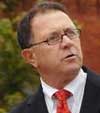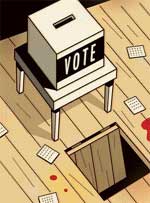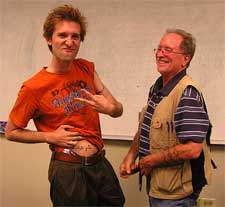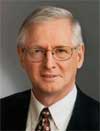Nov 4, 2008
Posted | 4 comments
I‘m not an evangelical voter, though I’m happy to have any honest discussion about politics. I like information and understanding.
I’m not a secretive voter, either. I don’t mind telling anyone how I vote or why I do it.
There are two races on which I’ll vote tomorrow that have national significance:
- House of Representativess, 24th District, Michael Arcuri [D] vs. Richard Hanna [R]
- President of the United States, John McCain [R] vs. Barack Obama [D]
House of Representatives, 24th District, Michael Arcuri [D] vs. Richard Hanna [R]

Richard Hanna is a breath of fresh air in Central New York. He’s a businessman, not a career politician. If he’s not silver-tongued like his opponent, it’s to his credit. I’ll take a genuine guy over a weasel of a politician any day.
Michael Arcuri is a shill for his party - he’s a Blue Dog on paper only. As late as September, over 80% of his campaign contributions had come from outside our district. Arcuri serves his party nationwide and in Washington more than he serves the 24th Congressional District. They might love him for it. I don’t.
Richard Hanna didn’t have $5,000/plate breakfasts held hundreds of miles from his district. If he’s a shill, it’s for people in Upstate New York - and that’s exactly the type of shill I want.
Their stances on the large, looming national issues are fairly predictable given their respective parties. They did differ a great deal on education funding, as I wrote last week, and on their understanding of public education. Hanna not only gets how we deliver, monitor and improve public education, but he understands how it relates to that ‘brain-drain’ we’ve got in Upstate NY.
After two years of Michael Arcuri’s impotent representation, Richard Hanna is a welcome alternative.
My vote for the 24th Congressional District of New York is for Richard Hanna.

President of the United States, John McCain [R] vs. Barack Obama [D]

I’m a simple guy. The government’s got two main functions: to keep me safe and to stay out of my way. Senator John McCain will be better than his opponent at both.
My vote for the President of the United States is for John McCain.
Nov 4, 2008
Posted | 0 comments

About a week ago I compared local candidates’ responses on education funding and then gave those candidates a grade. The grades ranged from F [no response] to A-.
Hey, it’s hard to be perfect with such a difficult, complex issue - and I don’t engage in grade inflation - but our area has a few candidates with great promise.
Here’s a rundown of links and grades:
Vote early, vote often, etc. etc.
Nov 3, 2008
Posted | 0 comments

From the American Council of Trustees and Alumni:
“An article from today’s New York Times considers the debate over the extent to which professorial politics influences students. While nearly everyone agrees that faculties on the whole tend be politically one-sided, many observers dispute whether this imbalance has any consequence in the classroom. Brooklyn College history professor KC Johnson says “yes,” pointing out that the problem is less political than pedagogical, with many disciplines within the humanities (such as diplomatic and military history) being pushed to the margins. ACTA’s own Anne Neal agrees, noting that the problem lies not in a simplistic “left-right” characterization, but instead to the essence of what is taught. Do professors influence students? Yes, surely, since students cannot know what is not taught. That is why ACTA advocates the need for institutions to demand a coherent core curriculum offering exposure to such central subjects as Western Civilization and American History.
ACTA has, as the Times notes, followed these issues closely, with our publications on Intellectual Diversity and the core curriculum advancing a critique of the current state of higher education, and showing ways in which trustees can help their institutions reach a solution.”
What isn’t taught is, at this point, more destructive than much of the tripe that is taught.

When you’re done with those links, hop on down a few rungs and read the latest plea from Boston University Dean of Students Kenn Elmore. In “It’s time to show them what we’ve got”, Elmore writes with all the flair, conviction and intellectual seriousness of A Christmas Story’s Ralphie on that ‘What I Want for Christmas’ theme:
“Plenty of naysayers doubt that individuals with the opportunity to vote for the first time will actually show up. They also point to prior statistics that cast a doubt that you — a young voter, a student — will even show up tomorrow or have cast an absentee ballot by now. We often hear about record numbers of young people registering to vote but are disappointed on election day. We apparently want to be on the list but just don’t have the time to make it to the party.
Let’s show the country that its young people care and have a say in the direction of our cities, towns, states, and nation. Your local candidates, referenda questions, and national officers in waiting need to know that you showed up and made a decision. Get prepped and do what you’ve got to do tomorrow. Show the nation that we’re here and ready to bring it in the future. Show ‘em what you got!
Be safe and stay well,
Kenn Elmore
P.S. Don’t forget that there are elections held every year (not every four).”
C+!
That post script is in line with an older post in which the good Dean “bemoans” the ignorant public.
Though I’m impressed that he nailed referendum/referenda, I do wish the Deanship was an elected and not an appointed position.
Nov 3, 2008
Posted | 2 comments

[ Photo: William Ayers, Distinguished Professor of Education and Senior University Scholar at the University of Illinois at Chicago, compares tattoos with a developing revolutionary. When asked the location of Ayers' tattoo[s], our young comrade replied, “lemmie [sic] just tell you this, we both wear red underwear.” ]
George Leef of The John William Pope Center for Higher Education Policy offers some sober analysis of Bill Ayers’ invitation recall at the University of Nebraska. Now that the dust has settled a bit, what did Leef uncover?
A bunker filled with weapons-grade baloneyium:
“But is this case one of abridging academic freedom? I don’t think so. No one is demanding that Professor Ayers stop saying and writing what he believes. The University of Nebraska’s decision to disinvite him is bad manners, but it no more attacks his academic freedom than if he had never been invited in the first place. Academic freedom does not entail a right to speak wherever you might want to.
This tempest in a teapot does no credit to the University of Nebraska and state political leaders, but neither does it for those who cry that academic freedom is in peril.”
Agreed. Agreed, agreed, agreed.
Erin O’Connor wrote an excellent, short piece on Ayers/academic freedom:
“What’s happening to Ayers is intense and certainly unpleasant. But public figures-and Ayers most certainly is that-invite scrutiny, challenge, and criticism. The marketplace of ideas can be a rough place. And we should remember that Ayers does have legal recourse if he is libeled. We should also remember that none of this has anything to do with academic freedom.As long as Ayers’ employer leaves him alone-as long as there is no attempt to investigate or discipline him for his speech, as long as he is left alone to teach and research as he sees fit-his academic freedom is fine.”
Another recent post by O’Connor details the misunderstanding of academic freedom within the academy.
John Silber’s discussion of academic freedom circa 1988 helped me understand what it was all about. Maybe I’ll scan’n'share those pages when this election nonsense dies down.
Nov 3, 2008
Posted | 0 comments

Richard P. Mills has served as New York State’s Education Commissioner for 13+ years. Today he notified the Board of Regents that he’s stepping down in June, 2009:
“Mills continued, “There is no better time for a transfer of leadership than when an organization is strong and the building blocks for the future are in place. I am confident that my successor will find an agency of strength with a compelling agenda for the future.”"
Mills’ tenure has been as unremarkable as the press release. Standard stuff, nothing incredible, nothing awful.
Richard P. Mills is the Tim Wakefield of education. 4th starter, a few flashes of brilliance, a few meltdowns, fairly inexpensive and predictable. 178 Wins, 157 Losses, 4.32 ERA.
- TWIE is more concerned with Mills’ future than I am.
- GothamSchools points to a Newsday story about the possible re-organization that will follow Mills’ departure.
- Just those two links from today because the education world is engaged in a collective yawn.
On a personal note, Commissioner Mills’ early work on Regents passing grades introduced me to the phrase “Raising the bar by lowering the floor.”
Who’s next? We’ll wait and see. It’s a little early for that.

![]()








